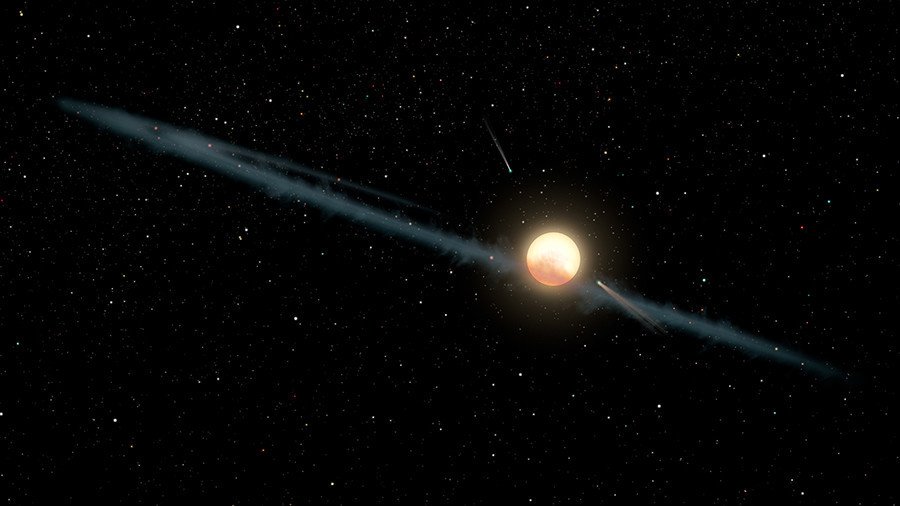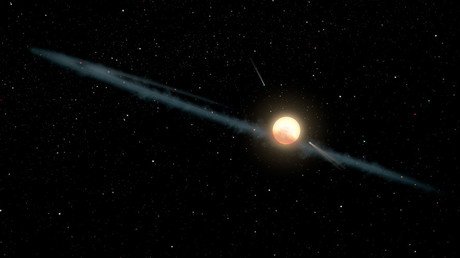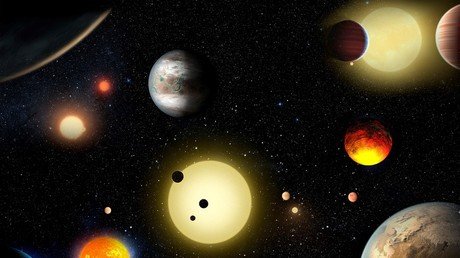Batmobiles on Mars and alien megastructures: RT probes space theories

Finding alien life is an exciting prospect, but the sheer vastness of space can leave a vacuum to be filled with conspiracy theories and wishful thinking. One alien theory, surrounding Tabby's star, has now been debunked.
The dimming of the Cygnus constellation star, given the moniker of KIC 8462852, has yielded speculation that something large, such as an alien spacecraft, may be orbiting it. The theory excited academics in SETI science (Scientific Searches for Intelligent Extraterrestrial Life), the general public and headline writers alike.
The bizarre light fluctuations from the star, which is 50 percent bigger than the sun, were first observed by citizen researchers in 2015 from data obtained by NASA’s Kepler space telescope.
Mystery of ‘alien megastructure’ star deepens after further study https://t.co/ze7K6icmfwpic.twitter.com/PHLbs5yH6W
— RT (@RT_com) August 6, 2016
It led to a number of theories, including that comets or even an alien-made structure could be blocking its light. Now a new paper involving those who originally cottoned onto the sporadic dips in brightness, pretty much blows the alien megastructure theory out of the sky.
In collaboration with the Las Cumbres Observatory, more than 200 researchers pored over data which showed that light wavelengths around the star were dimming unequally. The researchers, who used the ground telescope data from 2016-2017, suggest a solid entity is unlikely to do that.
“Dust is most likely the reason why the star’s light appears to dim and brighten. The new data shows that different colors of light are being blocked at different intensities. Therefore, whatever is passing between us and the star is not opaque, as would be expected from a planet or alien megastructure,” said lead author of the study, Tabby Boyajian.
Penn State University Professor Jason Wright, who was involved in the recent analysis of KIC 8462852, told RT.com that the “alien megastructure” theory was spawned out of an interview he gave in 2015. He later discussed the “very unlikely” prospect that the dimming could be caused by aliens collecting solar energy.
“It all started with an article by Ross Andersen in The Atlantic. He broke the story and that article got everybody excited,” he said.
Wright said the mention of aliens attracts interest from many areas, be it the general public or scientists searching for extraterrestrial life. But he believes alien aspect to Tabby’s star wasn’t necessarily a bad thing. In fact, it may have been good marketing for science.
“I think it attracted a lot of attention to the star for better and for worse,” he said. “But the better part is that it highlighted the mystery and how strange this star is. It made a lot of astronomers aware of how they could contribute and a lot have. In this particular case, we had over 200 people working with us to try and figure it [Tabby’s star] out.”
‘Alien megastructure’ star emitting inexplicable light patterns #RTBest2017https://t.co/XeJFIRsrHCpic.twitter.com/UDRL5B54sq
— RT (@RT_com) December 31, 2017
This latest ‘debunk’ follows a familiar path worn by other alien theories, such as the Batmobile on Mars, a UFO at the Vandenberg air base and the Oumuamua aliens.
‘Oumuamua’ aliens
The incursion of a cigar-shaped object into the Solar System raised hopes that it might derive from some sort of alien technology. Dubbed Oumuamua, it became the first interstellar object to pass through the Solar System back in October.
Researchers from the Breakthrough Project, a $100 million astronomical program formed to search for alien life beyond Earth, found no evidence of artificial signals in his initial observations in December. Scientists from Queen’s University in Belfast reported that the object was made up of an icy crust.
“We have discovered that the surface of ‘Oumuamua is similar to small solar system bodies that are covered in carbon-rich ices, whose structure is modified by exposure to cosmic rays,” said study lead Alan Fitzsimmons.
UFO Vandenberg air base
A perhaps more clear-cut debunk of possible extraterrestrial existence came in December when a streaking light was observed in the sky by people in Southern California.
Nuclear alien UFO from North Korea pic.twitter.com/GUIHpKkkp5
— Elon Musk (@elonmusk) December 23, 2017
The incredible combustion came from a SpaceX Falcon 9 rocket, which had launched from the Vandenberg air base. SpaceX founder Elon Musk played up to the alien theory by tweeting that the apparent UFO had come from North Korea.
Batmobile on Mars
Some Redditors jumped on the theory that debris seen in an image of NASA’s Mars Rover Mission was that of an UFO shaped like a Batmobile.
A less enthralling, but perhaps more plausible explanation, was that the debris came from a protective heat shield for the Opportunity Rover.
International Space Station alien encounter
In January 2017, an interruption to a NASA International Space Station feed fueled speculation of a UFO presence.
NASA gave an explanation that the feed was either going through a camera change or signal loss. However, online blogger Bright Insight spread the theory that an object appearing on screen caused the feed to be pulled, stating it was either about aliens or “top secret technology.”
Scott Brando’s alien-sighting website UFO of Interest told RT.com that the object was “just a lens reflection.” He said: “It’s a well known effect, very common in many ISS live feeds.”
NASA did it again: International Space Station feed cut out moments after appearance of unusual orb (Join our POLL) https://t.co/jlPKFdelcnpic.twitter.com/evBdD5ltVu
— RT (@RT_com) February 1, 2017














